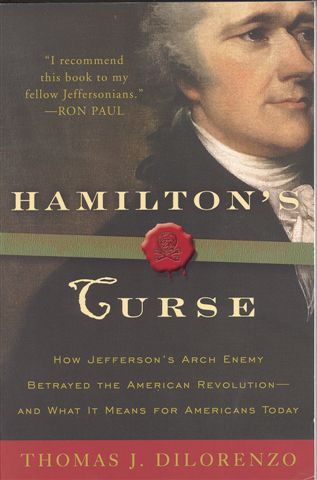|

|
"Hamilton's Curse"
by Thomas J. Dilorenzo
Book Description
Publication Date: October 21, 2008
Two of the most influential figures in American history. Two opposing political philosophies. Two radically
different visions for America.
Thomas Jefferson and Alexander Hamilton were without question two of the most important Founding Fathers. They
were also the fiercest of rivals. Of these two political titans, it is Jefferson—–the revered author of the Declaration
of Independence and our third president—–who is better remembered today. But in fact it is Hamilton’s political
legacy that has triumphed—–a legacy that has subverted the Constitution and transformed the federal government
into the very leviathan state that our forefathers fought against in the American Revolution.
How did we go from the Jeffersonian ideal of limited government to the bloated imperialist system of Hamilton’s
design? Acclaimed economic historian Thomas J. DiLorenzo provides the troubling answer in Hamilton’s Curse.
DiLorenzo reveals how Hamilton, first as a delegate to the Constitutional Convention and later as the nation’s
first and most influential treasury secretary, masterfully promoted an agenda of nationalist glory and interventionist
economics—–core beliefs that did not die with Hamilton in his fatal duel with Aaron Burr. Carried on through his
political heirs, the Hamiltonian legacy:
• Wrested control into the hands of the federal government by inventing the myth of the Constitution’s “implied
powers”
• Established the imperial presidency (Hamilton himself proposed a permanent president—–in other words, a king)
• Devised a national banking system that imposes boom-and-bust cycles on the American economy
• Saddled Americans with a massive national debt and oppressive taxation
• Inflated the role of the federal courts in order to eviscerate individual liberties and state sovereignty
• Pushed economic policies that lined the pockets of the wealthy and created a government system built on graft,
spoils, and patronage
• Transformed state governments from Jeffersonian bulwarks of liberty to beggars for federal crumbs
By debunking the Hamiltonian myths perpetuated in recent admiring biographies, DiLorenzo exposes an uncomfortable
truth: The American people are no longer the masters of their government but its servants. Only by restoring a
system based on Jeffersonian ideals can Hamilton’s curse be lifted, at last.
More About the Author
Thomas J. DiLorenzo
Biography
Thomas J. DiLorenzo is the author of The Real Lincoln and How Capitalism Saved America. A professor of economics
at Loyola College in Maryland and a senior fellow at the Ludwig von Mises Institute, he has written for the Wall
Street Journal, USA Today, the Washington Post, Reader's Digest, Barron's, and many other publications. He lives
in Baltimore, Maryland.
5.0 out of 5 stars How Hamilton's un-American ideas became the basis of the "American System" October
30, 2008
By Jason
Format:Hardcover
In Hamilton's Curse, author Dr. Thomas J. DiLorenzo traces the roots of America's economic and political
systems to the first secretary of the Treasury Alexander Hamilton. We are truly living in "Hamilton's Republic,"
says Dr. DiLorenzo -- but this is far from a good thing.
While it is Thomas Jefferson's face that graces Mount Rushmore, and tremendous lip service is paid to his greatness
as a political thinker and president, in reality, Jefferson's ideas have been entirely marginalized, while those
of his arch rival Hamilton now form the backbone of the American political establishment. The Revolution of 1776
was a Jeffersonian Revolution to throw off the yoke of British mercantilist imperialism and install it its place
a voluntary union of free and independent states. Hamilton and his acolytes, however -- no matter how bravely and
earnestly they fought against the Red Coats -- wanted to import British mercantilism to America with the U.S. aristocracy
(Hamilton and his Federalist buddies) on the receiving end of the mercantilist spoils system. In fact, DiLorenzo
argues that the Constitution itself was a virtual coup against the free republic of the Articles of Confederation
for the purpose of increasing the authority of the central government -- key to Hamilton's plans.
But Hamilton couldn't create the unitary nationalist government in one fell swoop. Indeed, his plans to install
a permanent president -- an American king -- with the power to appoint state governors and veto state legislation
failed miserably. But as soon as the Constitution was ratified, Hamilton (who argued the pseudo-Jeffersonian case
for its ratification in the Federalist Papers) set about subverting it. It was Hamilton who invented the concept
of "implied powers."
Hamilton had George Washington's ear, and while historians act as if our first president was an "independent,"
the fact is that he almost(?) exclusively appointed Federalists -- meaning men who supported ratification of the
Constitution -- to the bench. These were by and large men who simply wanted to increase the federal government's
power over the states, and thus America was on the wrong path from the onset of the first presidency. The Federalist
near-monopoly on the judicial system gave Hamiltonianism a foothold even as it suffered electoral defeat after
electoral defeat -- starting with the election of Hamilton's arch rival Thomas Jefferson to the White House.
Indeed, it wasn't until the War Between the States, as DiLorenzo calls it, that Hamiltonianism -- which had lost
on the battlefield of ideas -- was installed on the actual battlefield, by brute military force. Lincoln was a
Whig before he was a Republican, and the Whigs were the ideological descendants of Hamilton's Federalists. With
Lincoln as their standard bearer, the new Republican Party had a full-fledged Hamiltonian agenda consisting of
protectionism, high taxation, national centralism, corporate welfare, militarism, and national banking. These were
the true issues over which the "Civil War" was fought, says DiLorenzo.
The Hamiltonian Republicans reigned over America almost uninterrupted for the next 52 years, until Woodrow Wilson
-- a Hamiltonian of the Left -- was elected. Under Wilson, Hamiltonianism reached its zenith (or nadir), as the
income tax, direct election of senators, and Federal Reserve all came into existence. Entirely gone was the Jeffersonian
republic of "states' rights." DiLorenzo also says that the American "Progressives" who brought
about these horrors were directly influenced by the German Historical School -- which itself was strongly influenced
by Hamilton. Thus, things came full circle.
DiLorenzo concludes this wonderful book with a road-map to ending the curse. Unfortunately, I have virtually zero
faith that Americans are ever going to wake up and reassert Jeffersonian principles. As DiLorenzo explains, we
now have several generations who have been taught Hamiltonian/Lincolnian myths in institutionalized schooling to
the point that both the Left and the Right view Hamilton as a great hero. In reality, he was perhaps the greatest
scoundrel in American history. If only Aaron Burr's bullet could have spared the man but killed his wicked ideas!
44 of 53 people found the following review helpful
5.0 out of 5 stars Political Economy at Its Best November 18, 2008
By terry
DiLorenzo has made a difficult subject readable. It is an American political economic history covering a period
from the Ratification Debates to the present. It is told from the contrasting viewpoints of Jefferson and Hamilton,
as to the political system which the secession from England was meant to create.
For me, it covered new ground and reinterpreted well some ground I thought I had understood. It is both chronological
and topical history. The author's use of original and secondary sources added to its value. All of which made it
a fruitful present exercise and a tool for future reference.
As has been noted by other reviewers, it has special present circumstance value. National Bank/Federal Reserve
Bank is the pivot point of today's rational pessimism. And it is the legacy of Alexander Hamilton. Greed comes
with human seed; Hamilton's ideology centralized it.
I suppose, in the dark history of "democracy" and its variants, one could have drawn the baseline with
Solon or Pericles. However, in the uniquely American variant of a "democratic" social contract, it is
Hamilton's legacy that needs scrutiny. And DiLorenzo delivered such fully.
Whether it is the Supreme Court, The Fed, regulatory practices, the income tax, direct election of Senators, protectionism,
or standing armies, Hamilton is the genesis. Our "Great Experiment" had a frightful beginning, a precarious
middle and, obviously, might have an oligarchic end. We had a chance to design a system based on Jefferson's theories,
but we have chosen otherwise. Perhaps we're cursed by Hamilton.
Robert Higgs, one of the many fine writers referenced in this book, asked himself in print recently: have we been
led by fools or mountebanks? He answered: yes! And in reading this great book, I thought often that Hamilton might
be both.
|
 |


